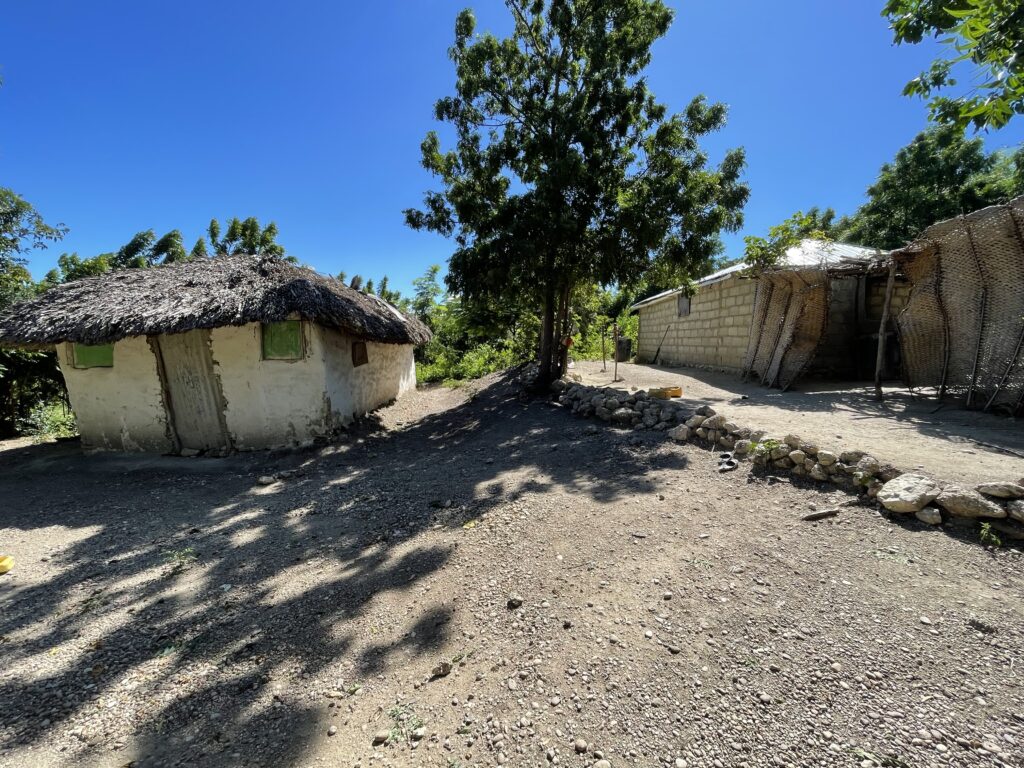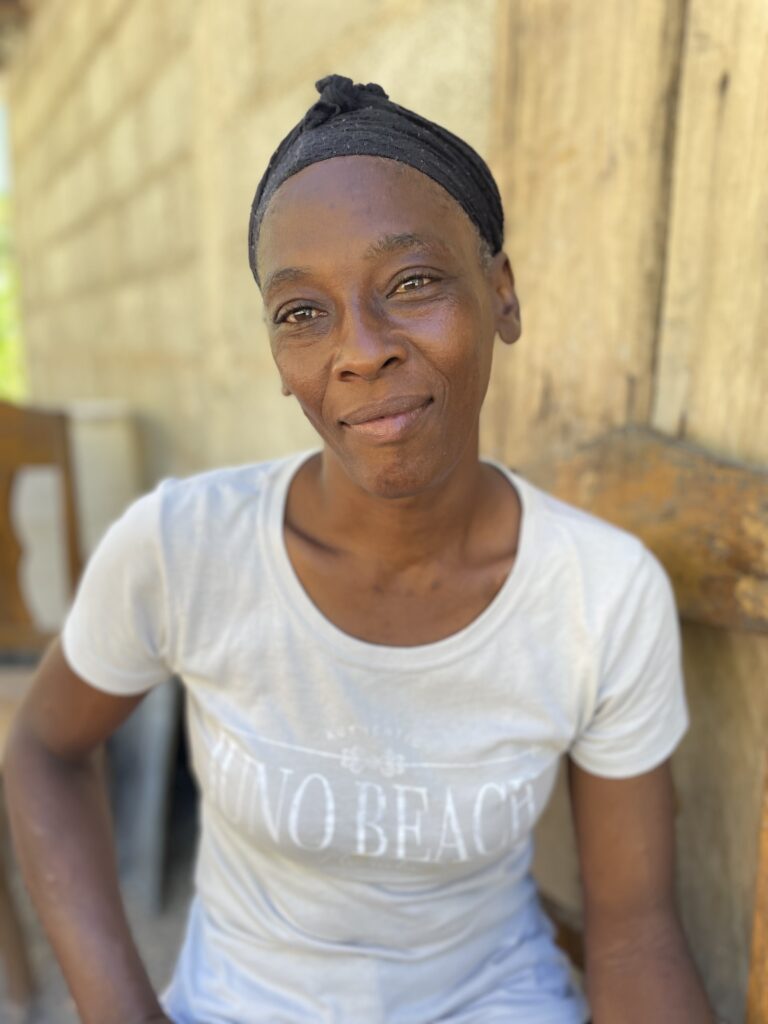Granisia lives in Granfòn, a neighborhood that is a short, winding path off the main road that cuts through Bedeyenn. She lives with her husband and their three daughters.
Her husband Louisius used to contribute to the household income by making cooking charcoal. When he had a load ready for sale, he would contact a merchant, who would collect it and bring it to market.
But his strength has deteriorated over the last years, and he could not longer do the heavy work that charcoal production requires. He began collecting and selling the long, straight branches that the poorer Haitians in the region split and weave together to make walls for their homes, but this work is less profitable.
Granisia herself had a grocery business, selling food staples to neighbors out of her home: sugar, rice, flour, etc. She had about 10,000 gourds in the business, at a time when that was enough to buy a reasonable amount of stuff. But her husband’s reduced income put strain on the business. The expenses of feeding their children and sending them to school ate away from her capital until, by the time she joined CLM, almost all of the money in her business was gone. She was left with little more than some rum, which she sold by the shot, and a pack of cigarettes, which she sold one-by-one.
She joined the program and started to receive her cash stipend. Normally, these stipends have been distributed to CLM members in weekly payments, but getting hold of cash has been a struggle for Fonkoze the past couple of years, and the team in the Northwest decided to simplify things by paying once-a-month instead.
Granisia received 2,000 gourds, or about $15, per month for six months. It was very little money by most measures, but she did a lot with it. “I bought food for my family for 500 gourds, saved 500 gourds in my association, and put 1,000 into my business.” She added Toro, a popular energy drink, to her merchandise. She’d maximize her sales by putting her business on her head and hiking to the local cockfights, where rum and Toro is a popular combination and men like to smoke.
When the program gave her the first 15,000 gourds of her investment fund, she bought oil and sugar and a few other staples, which she sells out of her home. “I don’t like selling in the market. Too many people ask for credit.”
This is directly opposed to most of what we have heard over the years. Many members have told us that they sell in the market rather than at home because their neighbors are more likely to ask them for credit than strangers in a market are and it is easier to say “no” to the latter.
But Granisia has an explanation. “You have to sell some on credit either way, but when you give credit at a business in your home, you’re giving it to friends and neighbors who will pay.” She immediately cites the example of a neighbor who is dealing with a death in her family, which means receiving and feeding lots of people at a wake. “She didn’t know she’d have all that expense right now. I had to give her credit. It solves her problem and means a big sale for me.”
With the other 15,000 gourds that she receive, Granisia bought a goat and a sheep. Each has had a first litter, and both are pregnant again. She thinks the animals are important, because having a small collection of fertile females can enable you to send children to school every year.
Shortly after graduation, Granisia’s small commerce had shrunk back once more to a minimum, and it’s worth understanding why. When planting season came, she sold out most of her merchandise and invested her capital in her farming, holding on only to the business she carries to cockfights as a way to keep a steady trickle of income coming in.
Her main cash crops are beans and peanuts, and she has a plan for each. She plans to store her peanuts after harvest. The moment of harvest is normally when the prices are lowest. Thanks to her own hard work and the CLM program, she now has a dry, secure home where she can store peanuts safely until the prices rise again. She hopes that she’ll make enough to buy an additional goat. And she will reinvest in commerce, too.
She will sell some of the beans, as well, but some will be part of an interesting system of regional cooperation. She has friends farther up the mountain towards Ma Wouj. The difference in altitude is enough that the neighborhoods have different planting seasons. Part of Granisia’s harvest will be lent to friends uphill so that they have beans they can plant. When they have harvested, they will lend beans back to Granisia.


Sadilia lives in Dipre, right along a road that connects the main road from Answouj, through Bedeyenn, and up to Ma Wouj to Bonbadopolis to the southwest.
She and her two children had been living with the kids’ father with his family, but he wasn’t really able to contribute to helping her take care of them, and she was increasingly uncomfortable in her in-laws’ space. So she left with her children. Initially, she and the children moved in with her mother. She band their father were still together, though they did not live in the same home. Even when she had lived with her in-law’s, her partner had always had his own small, separate house.
For years, she did everything she could for her children through farming. She and her partner would plant their fields and then bring the harvest to market for sale. His contribution decreased and eventually stopped entirely shortly after she joined the program.
Sadilia talked to a sister who was willing to sell her a small plot on highly favorable terms. The total cost would be 100,000 gourds, or about $770, but she’d only need to pay 30,000 up front. “My sister will be patient.” Her sister actually wanted to give her the land as a gift, but Sadilia did not like the idea. “When she and I are gone, I don’t want any cause for confusion between her kids and mine.”
She’s poured half the investment capital that Fonkoze provided into a grocery business. She sells staples out of her home, but she also brings her business to a spot down the street, where there is a small daily market at an intersection. Locals shop there just for their immediate needs. Sales are small but steady.
With the other half of the fund, she bought two goats. Her care of them has yielded good results. She now has eight. She wants to use them to grow her commerce. Her local sales are strictly retail, but she hopes eventually to have enough capital to go buying wholesale in Gonayiv, the nearest city, and to become a supplier for the other merchants in her neighborhood.
Shortly after she graduated, her husband asked to move back in with her, now in her new home. She had to give it some thought. “He was away for a year, and when I ask him for his harvest during that year, he couldn’t give me anything.”
He’s now building her a new kitchen next to their home. She is not certain that the relationship will work out, but is clear about her reasoning. “I did it for the children. We have two together, and so I would already have to help out with any problem he might have anyway.”
